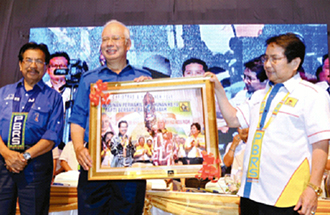No forced conversions: Najib
Published on: Monday, November 02, 2015

Kota Kinabalu: Prime Minister Datuk Seri Najib Razak on Sunday denied that the Barisan Nasional (BN) government forcibly converted people to Islam, amid mounting claims of Islamisation in Borneo. The Prime Minister and BN Chairman said that according to the principles of Islam, there is no compulsion and one cannot force the religion upon others. "If someone wants to convert, that is fine. But I guarantee this is not our policy," Najib said at the Parti Bersatu Rakyat Sabah (PBRS) conference here.
ADVERTISEMENT
"There might be some individuals, but this is not our approach and the aim of the BN government," he added. Najib said there is a concept in Islam that focuses on an individual's personal choice of faith. "So if there are any incidents (of forced conversions), please complain to the Chief Minister. These are not government policies," the Prime Minister said. PBRS President Tan Sri Joseph Kurup said earlier that there was growing unease among Sabahans, particularly the Christian Bumiputera who felt that their right to freedom of religion was being threatened.
ADVERTISEMENT
He cited the problem of non-Muslims, whose names have the "bin" or "binti" suffix, being wrongly classified as Muslims, as well as reports of conversions by way of coercion or deception, particularly among the rural folk. He said such irresponsible acts violated one's right to freedom of religion enshrined in the Federal Constitution and tarnished the name of the BN government among Sabahans, known for their harmonious multi-ethnic, multi-religious and multi-faith existence.
ADVERTISEMENT
"It also becomes complicated with the issue of the 'Allah' that should only affect the people in the peninsula, but because it has been politicised by the opposition, (it) has caused fear and anger among non-Muslims in Sabah," said Kurup, who is also Minister in the Prime Minister's Department in charge of national unity. He said the Cabinet's 10-point solution, which guarantees religious freedom in Sabah, is insufficient and Christians in the State would like to see a stronger policy such as an Act so that such freedom will not be manipulated by irresponsible groups."Religious freedom is an important foundation in the building of a peaceful, united and harmonious country. In Sabah, this is a familiar theme for us but whenever religion is politicised, the result would be devastating," he said. The 10-point solution, issued by Najib's administration shortly before the Sarawak election in 2011, allowed for bibles in Malay and indigenous languages to be printed, imported and distributed nationwide with certain conditions imposed for Malaya.It is seen as a fair and amicable way to manage the polarity of views between the various religious groups, in particular Christians and Muslims, taking into account the laws of the country.However, Najib had also stated that state enactments on the use of terms deemed exclusive to Muslims override the Cabinet's more generous 10-point agreement on the matter.PBRS, Kurup said, will never stand in the way of any individual who willingly wishes to convert to other religion as it is a personal choice.However, PBRS is totally against any form of conversion that has an ulterior motives and against the concept of religious freedom as enshrined in the Federal Constitution, he said."To make it worse, these types of conversion through deception create negative perception towards Barisan Nasional," he said.Kurup added that such situation is made even more complicated with the 'Allah' issue which was supposed to only affect those in Malaya but due to it being heavily politicised by the opposition that the order will be extended to Sabah, Christians in the State were scared and angry.The dispute over the word 'Allah' began in 2007 when the Home Ministry, which grants publishing licenses, threatened to withdraw the Catholic Church's newspaper, Herald's permit for using the Arabic word in its Malay-language edition, on the grounds of national security and public order.Stay up-to-date by following Daily Express’s Telegram channel.
Daily Express Malaysia




